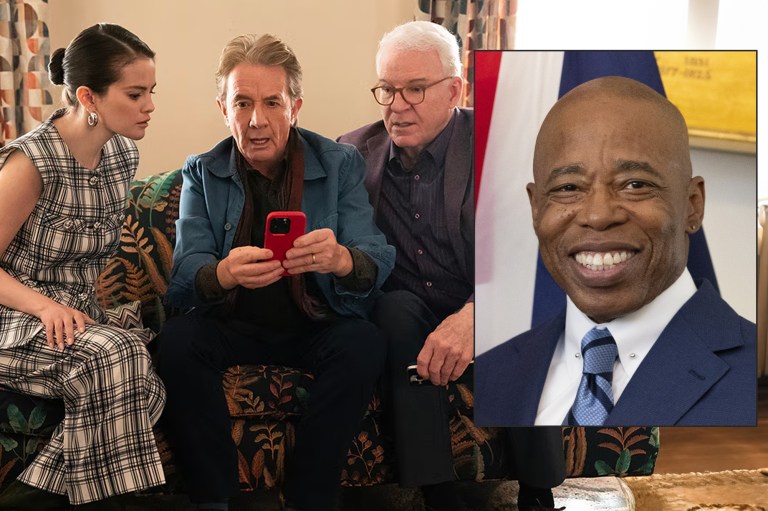
What It’s Like To Fall In Love With Someone Way Before They Get There
It can make a gal feel insecure to sit in the Love Train’s first car while her man rides caboose for a lengthy stretch, but it happens.

At cocktail parties, couples often share their charming courtship stories before inviting my boyfriend and me to reciprocate. That’s when I admit that I wanted my boyfriend the minute I saw him walk through the door of a restaurant back in 2007. For whatever biological or psychological reason, I explain, his swagger, over-confident smile, and white blazer won me over immediately. Then I reveal that it took my boyfriend three years to follow suit. And when he finally dropped the L-bomb, it was in the context of feeling “blindsided” by the sentiment.
We tend to romanticize Eros as a passionate fever that infects people simultaneously—during that memorable semester abroad in Rome, that impromptu weekend away, or that walk to the grocery store when someone first farted with abandon. As a frontrunner in love by a wide spread, however, I know that isn’t always the case.
For starters, it’s worth countering the argument that love at first sight doesn’t happen, or that it’s merely superficial. According to Dr. Helen Fisher, expert anthropologist and the author of Why We Love, our fairy-tale instinct developed so we could conserve time and energy by focusing on one prospective mate. But as some of us well know, an instantaneous connection can be one-sided. And for those lucky enough to date the object of their on-the-spot affection—whether immediately, or years down the line—emotional disparities can widen further before things stabilize.
Take Bridget Grossman, a 36-year-old financial executive who fell for her current husband as soon as they were designated beer pong teammates in college. “I was invisible to him for years before he asked me out,” says Grossman. Eventually, the two started dating, but during their early days together Grossman’s feelings progressed at a “frighteningly faster pace” than her partner’s. By the time she heard “I love you,” Grossman responded: “Thank God!”
It can make a gal feel insecure to sit in the Love Train’s first car while her man rides caboose for a lengthy stretch, but the truth is that timing matters. “The perfect partner can sit right next to you at a party, and you might not notice him or her if you’re too busy at work, enmeshed in another relationship, or otherwise preoccupied,” warns Fisher.
In retrospect, Grossman attributes her husband’s listlessness to post-collegiate career anxiety. Similarly, my boyfriend claims that he was emotionally handicapped by a nasty breakup when we first met, and thus incapable of recognizing our chemistry as readily as I did.
It’s well established that we’re better equipped to welcome a partner into our lives when contented. But since balance in mind, body, and heart is difficult enough for one person to maintain, it’s “even more absurd” to expect it from two people capable of loving each other simultaneously, writes Elite Daily’s Kathy Polo.
Couples that fail to harmonize amorously from the outset may not inspire romantic comedies, but they’re not necessarily less well suited to each other than those with tidier histories. It might just be that one person has some stuff to sort out.
What, then, should those affected by “bad” timing do while coping with the pangs of unrequited—or unevenly requited—love?
Aside from hiring a “prophet” to cast a few spells, or dousing oneself in an oxytocin laced body spray, there’s patience.
If you’re prepared to stick around, take advantage of the fact that romantic resistance doesn’t preclude building a friendship. Certain basic behaviors, including listening, caring, talking, appreciating, and respecting are crucial to forging all types of bonds.
In a New York Times essay, bestselling memoirist Augusten Burroughs recounts waiting ten years to profess his love to his literary agent, Chris, who, by then, was one of his dearest friends. Three years later, they were married.
Aspiring actress Rory Gable, 28, exemplifies the powers of platonic companionship and restraint. When Rory’s crush told her that he wasn’t “in the right place to date,” she decided to become his biggest supporter rather than delete him from her consciousness. Without pressing for more, she helped him fill out law school applications and doled out thoughtful advice as he dealt with his parents’ divorce. Law degree in hand, the once reluctant man asked Rory out.
To ramp up your fall-for-me measures, Dr. Fisher advises inducing the sensation of euphoria by doing new things together. “Novelty and excitement drive up the activity of dopamine and norepinephrine in the brain,” says Fisher. So in addition to answering those phone calls in the middle of the night, consider orchestrating an adventure, whether it involves making a soufflé, skydiving, or co-writing a screenplay.
Of course, there are no guarantees that friendship will transform into passionate romance. And in this era of instant gratification, patience is especially challenging. But if you feel strongly enough about a person, take it from a certified frontrunner that it’s worth holding onto that feeling while giving someone the chance to catch up.
Psychotherapist Philippa Perry notes that, as with sadness and happiness, “feelings of love come and go.” So waiting for the person you love to come around and/or working towards winning them over might not sound appealing, but doing so could be good practice for relationship management in the long-term.
We frontrunners might seem vulnerable, but by flexing our commitment muscles early on, perhaps we position ourselves to handle love’s inevitable ebbs and flows. ![]()











